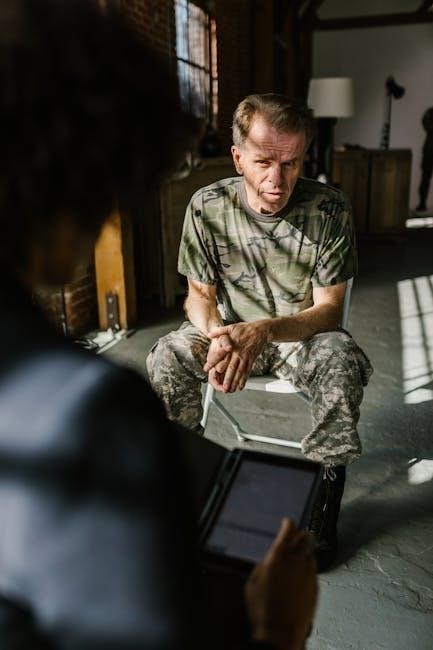
army initial counseling examples pdf
Army initial counseling is a critical process for new recruits‚ setting the tone for their professional journey. It addresses communication issues‚ attendance‚ and conduct‚ fostering growth and accountability.
Importance of Initial Counseling in the Army
Initial counseling is vital for aligning new recruits with Army values and expectations. It establishes a foundation for professional growth‚ clarifies roles‚ and addresses early concerns. This process ensures Soldiers understand their responsibilities‚ fostering accountability and teamwork. Effective counseling helps identify strengths and areas for improvement‚ promoting a supportive environment for development. It also sets the tone for open communication and mutual respect‚ which are essential for mission success. By addressing issues early‚ initial counseling prevents minor problems from escalating‚ ensuring Soldiers are well-prepared to contribute effectively to their units and achieve their full potential.
Overview of the Counseling Process
The counseling process begins with identifying the need for intervention‚ followed by preparation. Leaders gather relevant information and plan the discussion. During the session‚ open communication is encouraged‚ focusing on specific behaviors or issues. Active listening and empathy are crucial to ensure understanding. The process continues beyond the initial session‚ with ongoing monitoring and feedback. Documentation is maintained to track progress and provide a record of discussions. This structured approach ensures consistency and fairness‚ helping Soldiers address challenges and achieve personal and professional goals effectively within the Army framework.
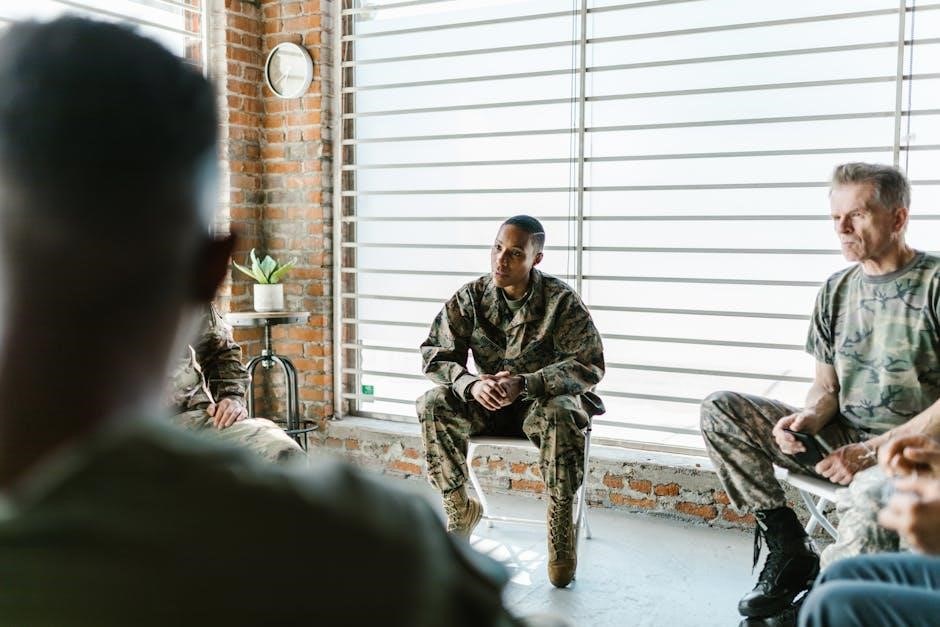
Purpose of Army Initial Counseling
The purpose of Army initial counseling is to guide new recruits in understanding expectations‚ fostering professional growth‚ and addressing specific issues through structured‚ continuous support and feedback.
Setting Expectations for New Recruits
Setting expectations during initial counseling ensures new recruits understand their roles‚ responsibilities‚ and the Army’s standards. This process addresses communication issues‚ attendance‚ and professionalism‚ providing clear examples and guidelines. By outlining these expectations early‚ leaders help recruits adapt to military life‚ fostering accountability and discipline. These examples‚ such as counseling for not communicating with team leaders or chronic absenteeism‚ emphasize the importance of meeting standards. Clear expectations create a foundation for success‚ ensuring recruits understand what is required of them to contribute effectively to their units and achieve personal and professional growth within the Army.
Building the Foundation for Professional Growth
Initial counseling lays the groundwork for a Soldier’s professional development by identifying strengths‚ addressing weaknesses‚ and setting achievable goals. Leaders use this process to outline expectations and provide constructive feedback‚ ensuring Soldiers understand their role in achieving both personal and organizational objectives. By fostering a growth mindset‚ initial counseling equips Soldiers with the tools needed to excel in their duties and advance in their careers. This foundation is critical for long-term success‚ as it encourages continuous improvement and accountability‚ helping Soldiers navigate the challenges of military life effectively.
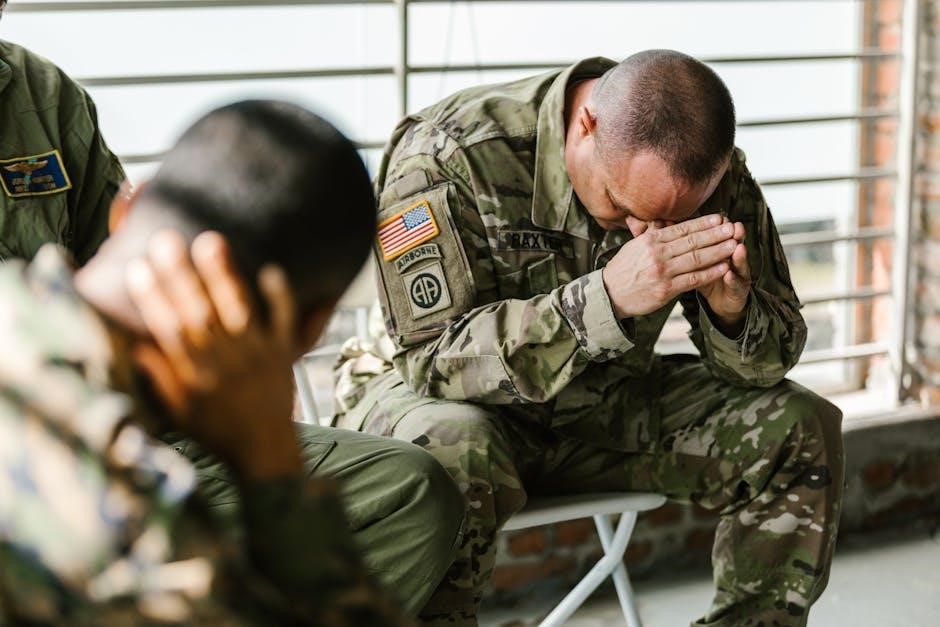
Key Components of Initial Counseling
Initial counseling involves identifying needs‚ preparing sessions‚ and using effective communication to guide Soldiers toward professional growth and mission readiness‚ ensuring a strong foundation for success.
Identifying the Need for Counseling
Identifying the need for counseling involves recognizing performance or behavioral issues in Soldiers‚ such as communication problems or attendance concerns. Leaders must observe and assess a Soldier’s actions to determine if counseling is necessary. This step ensures that issues are addressed early‚ preventing escalation. Effective identification requires active engagement and understanding of each Soldier’s strengths and challenges. Once a need is identified‚ leaders prepare for the counseling session by gathering relevant information and selecting the appropriate counseling type‚ such as performance or event-oriented counseling. This foundational step sets the stage for meaningful and impactful counseling sessions.
Preparing for the Counseling Session
Preparing for a counseling session involves gathering relevant information‚ such as performance records and specific examples of behavior. Leaders should review applicable Army regulations and counseling forms to ensure compliance. They must also create a supportive environment‚ free from distractions‚ to encourage open dialogue. Active listening skills and clear communication strategies are essential for effective counseling. Leaders should outline the session’s objectives and be ready to address the Soldier’s concerns. Proper preparation ensures that the counseling session is constructive and focused on resolving issues or improving performance. This step is crucial for achieving positive outcomes and fostering professional growth.
Effective Communication Strategies
Effective communication is vital in Army counseling sessions. Leaders should use active listening to understand Soldiers’ perspectives‚ ensuring clarity and empathy. Clear‚ concise language helps avoid misunderstandings. Maintaining eye contact and a non-confrontational tone fosters trust. Leaders should ask open-ended questions to encourage honest dialogue and provide constructive feedback. This approach helps identify root causes of issues and promotes solutions; Regularly summarizing key points ensures mutual understanding. Leaders must also adapt their communication style to the Soldier’s needs‚ addressing cultural or language barriers. Effective communication builds rapport‚ resolves conflicts‚ and supports personal and professional growth‚ aligning with Army values of integrity and respect.
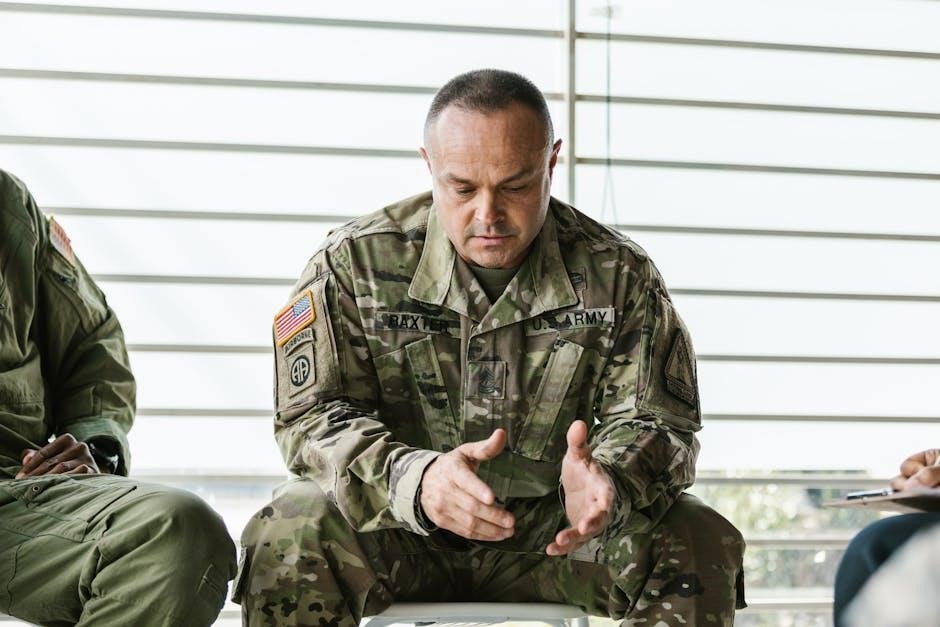
Types of Counseling in the Army
Army counseling includes Performance Counseling‚ Event-Oriented Counseling‚ and Professional Growth Counseling. Each type addresses specific needs‚ ensuring Soldiers receive tailored guidance for improvement and development.
Performance Counseling
Performance Counseling in the Army focuses on evaluating a Soldier’s job performance‚ identifying strengths‚ and addressing areas for improvement. It is a structured process where counselors provide feedback‚ set goals‚ and create development plans. This type of counseling is ongoing‚ ensuring Soldiers meet expected standards and grow in their roles. It includes documenting progress‚ discussing achievements‚ and addressing deficiencies. The goal is to enhance performance‚ align actions with mission requirements‚ and foster accountability. Effective performance counseling helps Soldiers understand expectations and improves overall unit readiness. It is a critical tool for leaders to guide and develop their teams successfully.
Event-Oriented Counseling
Event-Oriented Counseling in the Army is triggered by specific incidents or events‚ such as significant achievements‚ misconduct‚ or performance issues. This type of counseling is reactive‚ focusing on addressing the situation at hand. It involves discussing the event‚ its impact‚ and expectations for future behavior. Leaders use this counseling to reinforce positive actions or correct deficiencies. The goal is to ensure the Soldier understands the implications of their actions and aligns with unit standards. Event-Oriented Counseling is documented and serves as a formal record of the discussion‚ helping to maintain accountability and promote consistent behavior across the team.
Professional Growth Counseling
Professional Growth Counseling focuses on fostering long-term development and enhancing a Soldier’s career trajectory. This type of counseling helps Soldiers identify strengths‚ address skill gaps‚ and set achievable goals. Leaders guide Soldiers in creating personalized development plans‚ encouraging continuous improvement and alignment with Army standards. Regular feedback and mentorship are integral to this process‚ ensuring Soldiers are well-prepared for future responsibilities. Professional Growth Counseling emphasizes self-improvement and career advancement‚ helping Soldiers achieve their full potential while contributing effectively to their units. It is a proactive approach to building a competent and motivated force.
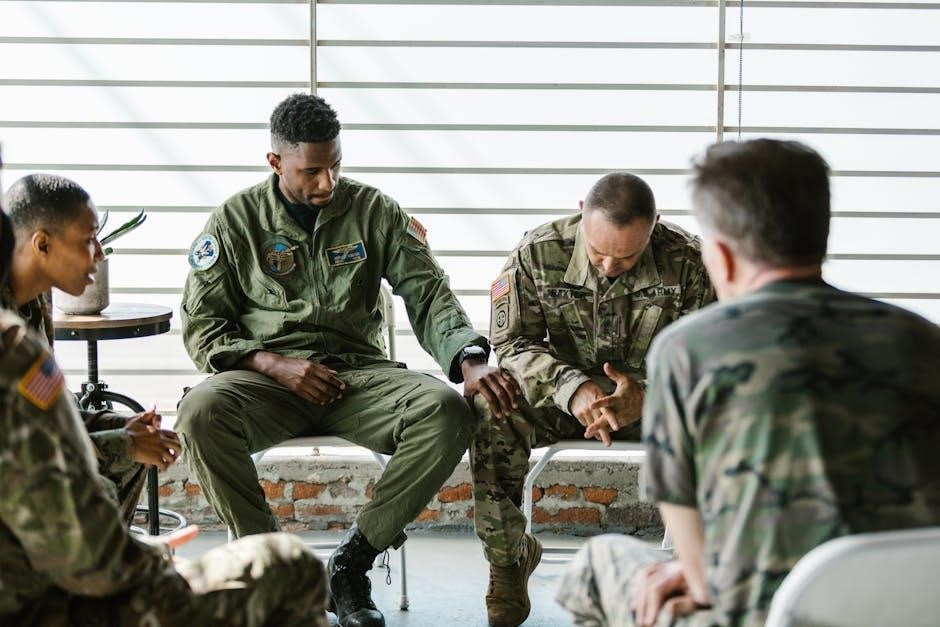
Examples of Initial Counseling Scenarios
Common scenarios include addressing communication issues‚ improving attendance‚ and enhancing professionalism. Counseling may also cover adapting to change‚ resolving conflicts‚ or developing leadership skills effectively.
Counseling for Communication Issues
Communication issues often arise in Army settings‚ particularly among new recruits. Counseling addresses these problems by identifying root causes‚ such as misunderstandings or ineffective listening. Leaders guide soldiers in developing clear and concise communication skills‚ ensuring messages are conveyed accurately. Techniques include active listening‚ clarifying expectations‚ and using feedback. For example‚ a soldier struggling to follow instructions may receive training on comprehension strategies. Effective communication is crucial for mission success and teamwork‚ making this counseling essential for unit cohesion and operational effectiveness. Counseling helps soldiers express concerns and improves overall interpersonal interactions within the unit.
Counseling for Attendance and Punctuality
Attendance and punctuality are critical in the Army‚ as they directly impact unit readiness and mission success. Counseling for these issues focuses on addressing absences‚ tardiness‚ or inconsistent work habits. Leaders identify underlying causes‚ such as personal problems or lack of accountability‚ and work with soldiers to create improvement plans. Clear expectations are set‚ emphasizing the importance of reliability. Counseling may include monitoring attendance‚ providing feedback‚ and offering support to overcome challenges. The goal is to ensure soldiers understand their role in team cohesion and operational effectiveness. Consistent follow-up helps reinforce positive habits and accountability.
Counseling for Professionalism and Conduct
Counseling for professionalism and conduct addresses behaviors that fall short of Army standards‚ such as disrespect‚ dishonesty‚ or unprofessional actions. Leaders use this opportunity to educate soldiers on expected behavior and the impact of their actions on the team. The counseling session focuses on identifying root causes of misconduct‚ reinforcing Army values‚ and establishing clear expectations for improvement. Soldiers are encouraged to reflect on their actions and take responsibility. Leaders provide guidance on resources‚ such as mentorship or training‚ to help soldiers meet standards. The goal is to foster a culture of accountability and professionalism‚ ensuring alignment with Army core values.
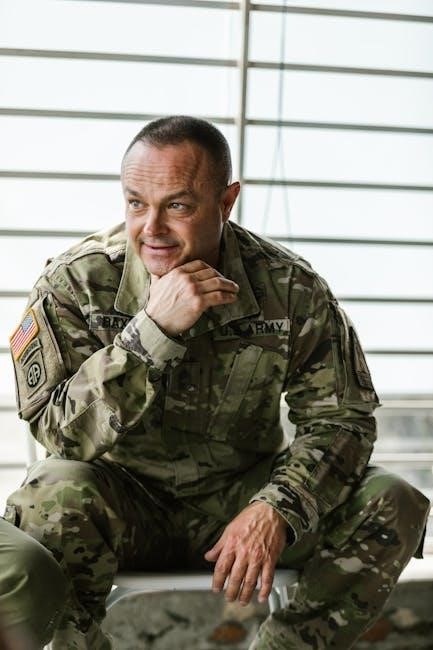
Best Practices for Conducting Initial Counseling
Effective initial counseling requires preparation‚ active listening‚ and clear communication. Leaders should establish a supportive environment‚ set realistic goals‚ and provide constructive feedback to guide soldiers.
Creating a Supportive Environment
Creating a supportive environment during initial counseling is crucial for fostering trust and open communication. Leaders should ensure privacy‚ maintain a neutral and non-threatening atmosphere‚ and demonstrate empathy. Active engagement without interruptions helps soldiers feel valued. Displaying approachable body language and a calm demeanor encourages honesty. Leaders must avoid judgmental attitudes and focus on understanding the individual’s perspective. A supportive environment allows soldiers to express concerns freely‚ fostering a positive foundation for growth and development. This approach ensures counseling sessions are constructive and aligned with the soldier’s needs and goals.
Active Listening and Feedback
Active listening and feedback are essential components of effective initial counseling. Leaders must fully engage with the soldier‚ maintaining eye contact‚ nodding‚ and using verbal cues like “I understand” to show attentiveness. Paraphrasing the soldier’s statements ensures understanding and demonstrates empathy. Providing constructive feedback involves being specific‚ timely‚ and focused on behavior rather than the person. This approach helps clarify expectations and fosters personal and professional growth. By actively listening and offering meaningful feedback‚ leaders build trust and encourage soldiers to take ownership of their development. This interaction lays the groundwork for a positive and productive counseling relationship.
Setting Clear Goals and Expectations
Setting clear goals and expectations is crucial in Army initial counseling to ensure soldiers understand their roles and responsibilities. Leaders should establish specific‚ measurable‚ and achievable objectives aligned with Army standards and the soldier’s career path. Expectations should be communicated clearly‚ emphasizing performance‚ conduct‚ and professional development. Regularly reviewing and updating these goals helps track progress and provides a roadmap for success. By setting clear benchmarks‚ leaders foster accountability and ensure soldiers remain focused on their growth and contributions to the unit. This clarity also builds confidence and motivation‚ enabling soldiers to meet and exceed expectations effectively.
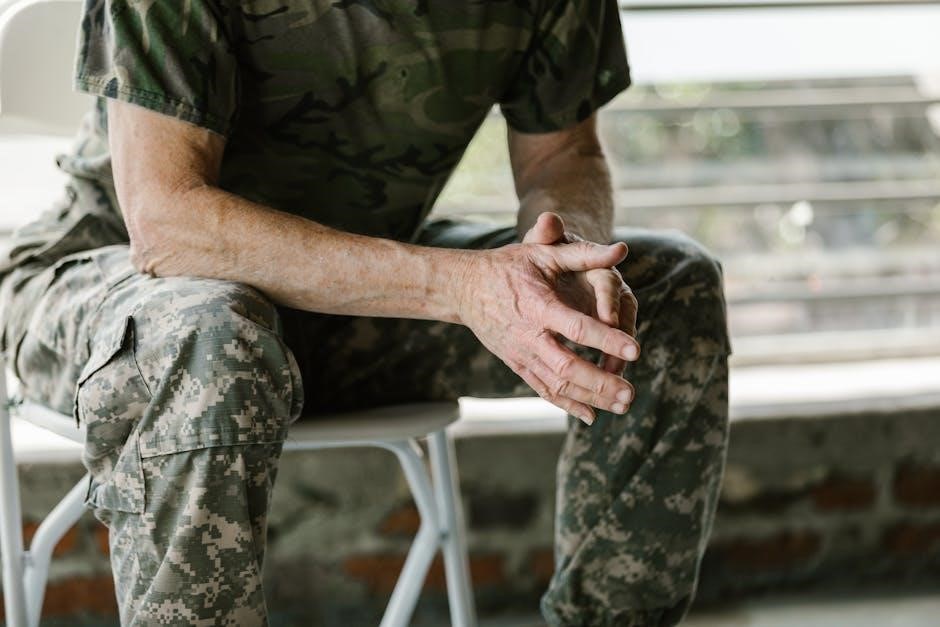
Documentation and Follow-Up
Accurate documentation ensures accountability and tracks progress‚ while regular follow-ups reinforce expectations and address concerns‚ maintaining consistency with Army regulations and standards.
Importance of Proper Documentation
Proper documentation in Army initial counseling is crucial for maintaining accountability‚ ensuring transparency‚ and providing a clear record of discussions and agreements. It serves as a legal safeguard‚ protecting both the counselor and the soldier. Accurate records help track progress‚ identify patterns‚ and address issues promptly. Documentation also ensures consistency in counseling practices and provides a reference for future interactions. By maintaining detailed and organized records‚ counselors can make informed decisions‚ align actions with Army regulations‚ and foster a fair and professional environment; Proper documentation is essential for accountability and supports the overall effectiveness of the counseling process.
Using Counseling Forms and Templates
Using standardized counseling forms and templates is essential for consistency and compliance in Army initial counseling. Forms like DA Form 4856 (Developmental Counseling Form) provide a structured format for documenting sessions‚ ensuring all critical areas are addressed. Templates guide counselors in covering key topics‚ such as goals‚ expectations‚ and action plans. They also help maintain professionalism and clarity‚ reducing errors and saving time. By leveraging these resources‚ counselors can ensure thorough and organized documentation‚ making it easier to track progress and maintain accountability; Proper use of forms and templates supports effective communication and aligns with Army regulations.
Monitoring Progress and Providing Feedback
Monitoring progress and providing feedback are critical components of effective Army initial counseling. Regular check-ins allow counselors to assess a soldier’s development and address any challenges promptly. Constructive feedback helps identify strengths and areas for improvement‚ ensuring growth and alignment with expectations. By setting clear‚ measurable goals‚ counselors can track progress and adjust plans as needed. This ongoing process fosters accountability‚ enhances performance‚ and builds trust. Effective monitoring and feedback also reinforce professionalism‚ leading to improved morale and unit readiness. Consistent follow-up ensures soldiers stay on track to achieve their personal and professional objectives within the Army.
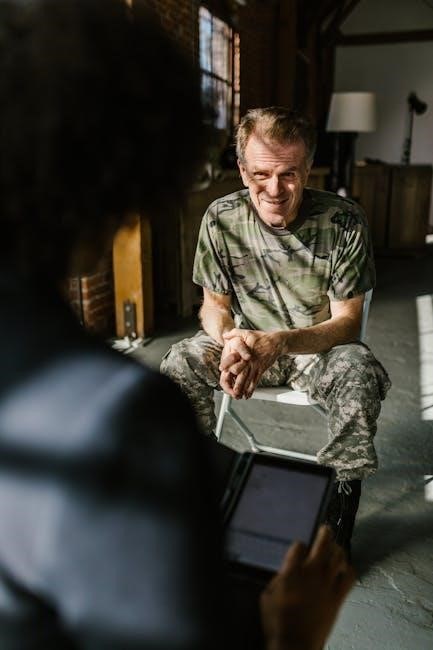
Legal and Ethical Considerations
Army initial counseling must adhere to legal and ethical standards‚ ensuring confidentiality‚ fairness‚ and compliance with regulations. This fosters trust and professional conduct within the military framework.
Confidentiality in Counseling Sessions
Confidentiality in Army counseling sessions is crucial to build trust and ensure open communication. Counselors must adhere to privacy standards‚ protecting sensitive information shared during sessions. This fosters a safe environment for service members to discuss personal or professional challenges without fear of repercussions. Breaches of confidentiality are addressed under Army regulations‚ emphasizing the importance of maintaining discretion. Proper handling of confidential information is essential for upholding professionalism and ethical standards in military counseling practices‚ ensuring that sessions remain respectful and constructive.
Ensuring Fairness and Equity
Ensuring fairness and equity in Army counseling is essential to fostering a just and inclusive environment. Counselors must treat all service members equally‚ regardless of rank‚ race‚ gender‚ or background. Fairness ensures that each individual receives unbiased guidance and opportunities for growth. Equity involves addressing unique needs and circumstances to promote balance and justice. By adhering to Army regulations and ethical standards‚ counselors can maintain impartiality and create a culture of trust and respect. Fair and equitable practices strengthen unit cohesion and uphold the Army’s commitment to diversity and inclusion.
Adhering to Army Regulations
Adhering to Army regulations is critical in initial counseling to ensure consistency‚ legality‚ and professionalism. Counselors must follow established guidelines‚ such as those outlined in AR 635-200‚ to maintain standards and avoid discrepancies. Proper adherence ensures that all actions are in line with military law and policy‚ protecting both the counselor and the service member. Regulations also provide a framework for addressing issues fairly and ethically. By following Army regulations‚ counselors uphold the integrity of the counseling process and contribute to a disciplined and orderly military environment. Compliance is non-negotiable to maintain trust and accountability within the ranks;
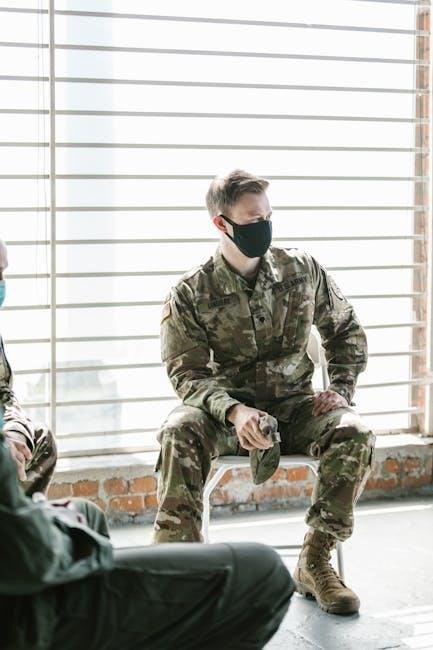
Training and Resources for Counselors
Counselors receive comprehensive training through Army programs and resources‚ ensuring they master effective counseling techniques and stay updated on regulations and best practices.
Available Training Programs
The Army offers structured training programs for counselors‚ including the Basic Leader Course and the Army Counseling Course. These programs focus on developing essential counseling skills‚ such as active listening‚ problem-solving‚ and conflict resolution. Additionally‚ the Army provides annual refresher training to ensure counselors stay updated on policies and techniques. These programs are supplemented by resources like the Counseling Desk Guide and online modules through the Army Training Network. Hands-on exercises and scenario-based training help counselors apply theoretical knowledge in real-world situations‚ enhancing their effectiveness in supporting soldiers.
Utilizing Army Counseling Resources
The Army provides various resources to support counselors‚ including the Counseling Desk Guide and DA Form 4856. These tools help structure counseling sessions and document progress effectively. Online platforms like the Army Training Network and the Army Learning Management System (ALMS) offer additional resources. Counselors can access example templates‚ checklists‚ and scenario-based guides to prepare for initial counseling. These resources ensure consistency and adherence to Army standards‚ aiding counselors in addressing common issues and promoting professional development. Regular updates to these materials reflect evolving policies and best practices‚ ensuring counselors remain well-equipped to support soldiers effectively.
Continuous Improvement for Counselors
Counselors must engage in ongoing education and training to enhance their skills. The Army offers courses like the Distributed Leader Course (DLC) and Senior Leader Course (SLC)‚ focusing on advanced counseling techniques. Regular peer reviews and feedback sessions help counselors refine their methods. Additionally‚ counselors can participate in workshops and webinars to stay updated on best practices. Self-study materials‚ such as Army Doctrine Publication (ADP) 6-22‚ provide guidance on leadership and counseling. Continuous improvement ensures counselors remain effective in addressing soldiers’ needs and fostering a productive military environment.
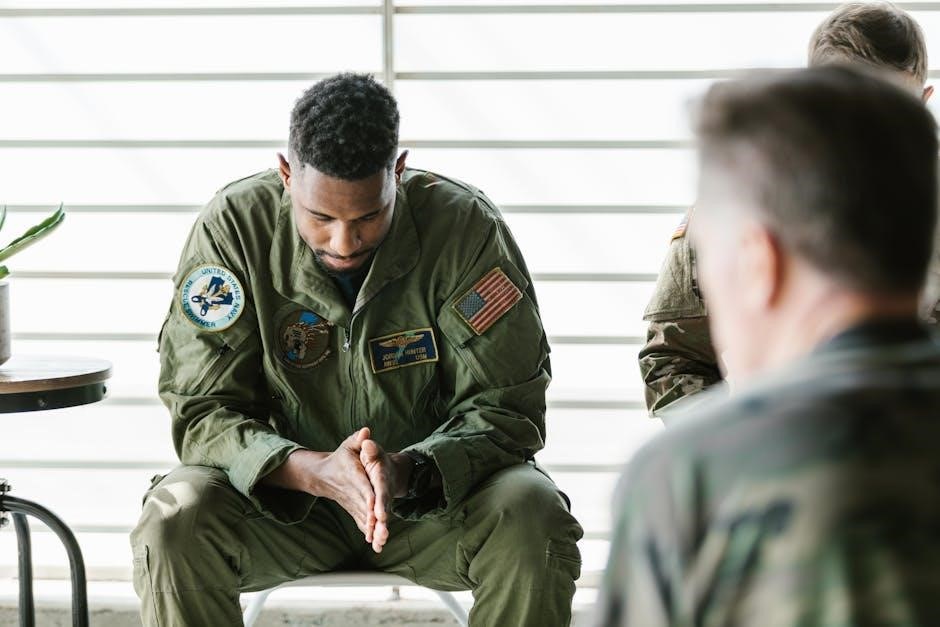
Common Challenges in Initial Counseling
Initial counseling faces challenges like soldier resistance‚ communication barriers‚ and time constraints. Addressing these issues requires patience‚ clear communication‚ and structured approaches to ensure effectiveness.
Addressing Resistance to Counseling
Soldiers may resist counseling due to fear of judgment or misunderstanding its purpose. Building trust is essential. Counselors should create a safe‚ non-threatening environment‚ emphasizing confidentiality and the benefits of counseling. Active listening and empathy help soldiers feel heard and valued. Addressing concerns directly and providing clear‚ relatable examples can reduce resistance. Involving peers or leaders who have positively experienced counseling can also encourage participation. Persistence and adaptability are key; tailoring approaches to individual needs fosters cooperation and openness‚ ensuring the counseling process is constructive and effective for all parties involved.
Managing Difficult Conversations
Difficult conversations in initial counseling require tact and professionalism. Stay calm‚ composed‚ and empathetic‚ even when faced with defensiveness. Use active listening skills to acknowledge the soldier’s perspective‚ ensuring they feel heard. Focus on specific behaviors or actions rather than making personal attacks. Provide clear‚ constructive feedback and offer actionable solutions. If emotions escalate‚ pause the conversation and revisit when emotions cool down. Maintain professionalism and avoid taking things personally. If necessary‚ involve a neutral third party or higher authority to mediate. Document the discussion and agreed-upon actions to ensure accountability and follow-through. The goal is to resolve issues while maintaining respect and discipline.
Overcoming Language and Cultural Barriers
Language and cultural differences can hinder effective communication in initial counseling. To address this‚ counselors should use bilingual resources or interpreters when necessary. Being culturally aware and sensitive is crucial to understanding the soldier’s background and perspectives. Non-verbal cues and body language can also play a significant role in bridging gaps. Counselors should adapt their communication style to align with the soldier’s cultural norms while maintaining professionalism. Providing translated materials or visual aids can further ensure clarity. Building trust through respect and empathy is essential for fostering open dialogue. Addressing these barriers ensures equitable and effective counseling for all soldiers‚ regardless of their background.
Effective initial counseling is crucial for setting clear expectations‚ fostering professional growth‚ and ensuring soldiers understand their roles. It establishes a foundation for accountability and continuous improvement‚ guiding soldiers toward success.
Summarizing the Importance of Initial Counseling
Initial counseling is essential for establishing a strong foundation for soldier development. It ensures clear communication of expectations‚ roles‚ and responsibilities‚ fostering accountability and professionalism. By addressing individual needs and goals‚ it aligns personal aspirations with unit objectives‚ promoting growth and readiness. Effective initial counseling also builds trust and openness‚ encouraging soldiers to seek guidance and improve performance. Ultimately‚ it sets the stage for continuous improvement‚ ensuring soldiers are prepared to meet challenges and contribute effectively to their units. Proper counseling practices are vital for maintaining discipline‚ morale‚ and mission success.
Final Thoughts on Effective Counseling Practices
Effective counseling is the cornerstone of successful soldier development. It requires preparation‚ active listening‚ and empathy to address individual needs. Counselors must foster a supportive environment‚ ensuring open communication and mutual respect. Clear expectations and documented goals guide growth and accountability. Regular follow-up and feedback are crucial for monitoring progress. By adhering to these practices‚ counselors empower soldiers to overcome challenges‚ enhance performance‚ and achieve personal and professional goals. Ultimately‚ effective counseling strengthens the Army’s mission readiness and fosters a culture of continuous improvement and shared success.